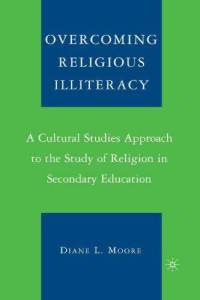Hold up. I don’t get the title.
Religious illiteracy (in this post) is defined as a lack of understanding about 1) the basic tenets of the world’s religious traditions; 2) the diversity of expressions and beliefs within traditions that emerge and evolve in relation to differing social/historical contexts; and 3) the profound role that religion plays in human social, cultural, and political life in both contemporary and historical contexts.
Where’d I come up with definition?
Glad you asked!
This semester, I’m excited to be taking a course with Diane L. Moore, Ph.D., Professor at the Harvard Divinity School and author of Overcoming Religious Illiteracy: A Multicultural Approach to Teaching About Religion in Secondary Schools. Dr. Moore presents a strong argument for the implementation of religious studies in public schools – a cause that I believe, if championed, would likely foster a greater appreciation for the role that spirituality plays in health.
In her own words, the premises of Dr. Moore’s argument are threefold:
First, there exists a widespread illiteracy about religion that spans the globe; second, one of the most troubling and urgent consequences of this illiteracy is that it often fuels prejudice and antagonism, thereby hindering efforts aimed at promoting respect for pluralism, peaceful coexistence and cooperative endeavors in local, national and global arenas; and third, it is possible to diminish religious illiteracy by teaching about religion from a nonsectarian perspective in primary and secondary schools.
What does this have to do with us?
Discussing spirituality from a medical perspective is often met with skepticism. Most people aren’t aware of scientific studies conducted within the field and usually assume that whoever breaches the subject is just trying to push his/her own religious agenda. (This is why there are two distinct Prayers and Apples categories: Christian Inspiration and Spirituality. Spirituality posts highlight the connection between practiced faith and physical/mental well-being, regardless of denomination and without preference towards any one particular faith.) I believe that improving religious literacy would help remove the stigma surrounding spirituality & health studies (i.e., that they’re somehow less scientifically sound than other areas of research) by making the subject of spirituality, itself, less taboo.
Bonus point:
While overcoming religious illiteracy might make discussing spirituality & health studies easier, Dr. Moore’s thesis offers another advantage that is equally important to our mind-body-spirit interests:
As a Christian, my own religious beliefs completely shape how I see and experience the world – a position that has (hopefully!) been made transparent on this blog. And yet, while I may be more vocal about this reality than others, as Dr. Moore explains, “religion is a social/cultural phenomenon that is embedded in human political, social and cultural life.” Meaning: people’s religious views are going to influence what they think (and how they feel about what you think) – regardless of whether they’re up-front with their belief systems or not.
Improving religious literacy (by implementing religious studies programs in schools) would not only encourage a more open and honest dialogue, but also provide a basis for individuals to more effectively evaluate, analyze and understand their counterpart’s views – an understanding which would certainly promote an enriched exchange of ideas and elevate future debate.
…Contributing to increased quality of oh, let’s say, maybe conversations about spirituality & health issues?
Tell me more!
This post is just a brief introduction to Dr. Moore’s ideas (and the ways in which her thesis might apply to Prayers and Apples readers). To learn more, please see Dr. Moore’s essay, Overcoming Religious Illiteracry: A Cultural Studies Approach!
What do you think about learning about religion in school? Keep in mind: there’s a difference between ‘religious learning’ (through a devotional lens) and ‘learning about religion’ (through an academic lens)!
References
Moore, D.L. (2007). Overcoming Religious Illiteracy: A Multicultural Approach to Teaching About Religion in Secondary Schools. New York: Palgrave.
Moore, D.L. (2008). Overcoming Religious Illiteracy: A Cultural Studies Approach. World History Connected. Retrieved: 12 February 2013.




thought 1: It’s not gonna happen while Obama is in office.
thought 2: Oh wait, you’re saying learning about religion. Thought 1 came about when I thought you meant studying about Christianity.
thought 3: State dollars would never be spent on such learning. Imagine students learning about the B.I.B.L.E. and Christianity.
thought 4: I don’t know how devotional vs. academic learning about religion could be “policed”. Seems like it would send attorneys into a frenzy.
You should def check out Dr. Morre’s essay, I think you’d really like it! Basically, students would learn about religion in the same way they learn about history, etc. So for example: with Christianity, students would learn, “People who practice Christianity believe X, Y and Z” – and the same objective approach would be applied to all faiths. So you wouldn’t be learning about the Bible, per se, but rather that “the Bible is the main Christian text.” You’re right that many people might get into a frenzy, but Dr. Moore presents a lot of interesting points about ways in which the subject could be taught so that there wouldn’t be any favoritism towards one faith or “pushing” of one belief over another. There’s a strong incentive for government support as many believe this type of schooling could lead to improved peace-keeping efforts (since people would be better able to understand one another’s views). But you’re right: it probably won’t happen any time soon!!